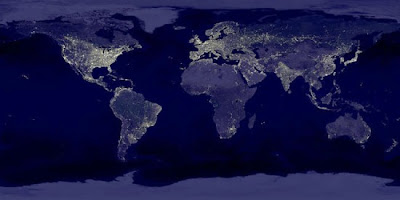A World That's Coming Unglued
By Alan Caruba
After you’ve read history for a number of years, you begin to realize that the world goes crazy every so often. People and nations just lose their wits. It’s usually in times of great change when old truths or old ways of doing things are thrust aside by new discoveries, new technologies, or just the renewal of old pathologies.
Instances of this include the Crusades, the Industrial Revolution, and the rise of fascism in the last century.
I think we are in a comparable period, for how long or short I cannot say, but to quote from Star Wars, “There’s a disturbance in the universe” or, to be more specific, among the nations of planet Earth.
Part of the problem is the sheer size of the human population. We now number in excess of six billion and there are serious issues of how to feed all of us, ensure clean water, employment, and, of course, the provision of the energy that fuels societies dependent on electricity.
Photos from space of the Earth at night tell one everything about which parts of the Earth are enjoying the benefits of electricity and which are not.
In the past, the four horsemen of the apocalypse, war, famine, disease, and death could be counted on to keep populations in check, but advances in technology, medicine, and agriculture have tipped the balance in favor of humanity.
Beyond sheer numbers, there is the problem of profligate spending that has several European nations, as well as the United States of America, in deep financial trouble. The merry-go-round of borrowing to keep bloated budgets afloat cannot continue indefinitely despite the efforts of central bankers to do so. Merely printing money has always led to bad events from riots to wars.
The financial problems are tied to the worst economic systems ever created, first as Communism, then its modified version, Socialism. Neither work. While politicians of every stripe like Socialism as a way to “redistribute” wealth, the entire system is confiscatory and based on coercion. It usually impoverishes the middle class of workers while creating an ever-growing class of those who will not or cannot work.
As harsh as Capitalism can be, it does work. It involves high levels of risk, often large amounts of investment, and it allows for failure. It is also the greatest engine of growth and the development of new industries, new technologies, and improved lives. Like fish in water, we are oblivious to the miracle a single supermarket represents.
All economic systems must strive to cope with corruption and, so long as there are three humans on Earth, there will be corruption. Having recently descended from the trees to walk upright, humans are subject to their aggressive nature.
Communism and Socialism promise equal misery. Capitalism offers the opportunity to enjoy the benefits of making the right investment guesses or developing new and better things people want to own. Competition improves life for everyone.
In sum, the clash between economic systems is still being worked out with nations that grant as much liberty as possible to their populations doing best. Where power is concentrated in a few, their populations and their nations do not prosper. As regards the world’s population, a huge cohort is young, unemployed and combustible.
It is the quest, the demand for more personal and political liberty that is causing much of the upheavals extant and no where is this more obvious than in those nations where Islam has been the prevailing religion. Islam translates as “submission.” It is based in seventh century strictures on how life should be lived. It is at war with modernity. It cannot prevail, but until it reforms or fails, there will be terrorism and war.
The greatest threat to humanity is the presence and continued quest for nuclear weapons. They are genocidal, capable of killing hundreds of thousands, if not millions. Allowing Iran, a nation led by a handful of crazed theocrats, to acquire nuclear parity poses a threat to humanity that has never existed before. Permitting North Korea or Pakistan to retain their nukes can only result in a bad outcome.
Like a rumbling volcano, the tremors felt as the result of the United States being led by a dedicated Communist and likely Muslim is a destabilizing factor not only for its citizens, but for others around the world.
It is up to the present leaders of the world to thread their way through the upheavals and divisions causing growing instability. Some will do it better than others. Some will cling to failed systems and philosophies of the past. Some will simply pursue power for power’s sake.
Alliances will change. Allies will become enemies. Enemies will become allies. Nations will pursue their shifting interests.
For the world in general, a good start would be the abandonment of the United Nations, an institution that failed initially as the League of Nations, and which is now so putrid with corruption and schemes to impose a one-world government that it poses a threat to the sovereignty of all nations.
Just as neighborhoods thrive when the common interests of neighbors for security and peace are observed, international organizations designed to concentrate power inevitably fall short of their heralded benefits.
In the same way shifts in the Earth’s tectonic plates, volcanic eruptions, and the latest cooling cycle are posing massive challenges for humanity, the nations of the world are trying to cope with changes in the financial universe they have created as well as outmoded concepts of security.
How the present upheavals, financial, religious, and demographic work themselves out remains unknown. In a neighborhood people find it best to “get along.” In a world beset with rival systems of belief and governance, the outcome is far more murky and, ultimately, more threatening.
© Alan Caruba, 2011
*************************


No comments:
Post a Comment